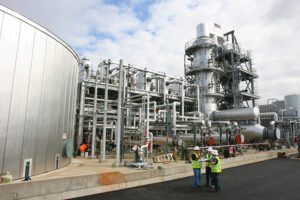The value proposition for biodiesel has been apparent since the early days of the industry, and new research completed in the last year is quantifying what we’ve long known to be true. Biodiesel is a domestically produced fuel that creates jobs, reduces greenhouse gas emissions, provides energy security, and serves as an economic boon for rural communities. What was once only potential has become reality as biodiesel pushes into the mainstream.
Let’s start with a straightforward figure that impacts anyone who owns a diesel vehicle or relies on the foods and retail goods that are shipped around the country, likely anyone reading this article. World Agricultural Economic and Environmental Services (WAEES) released a study that found that the volumes of clean fuels added to the nation’s fuel supply decreases the cost of regular diesel. The result is a four percent decrease in the price of diesel, about 22 cents per gallon off the average national price.
Reduced shipping and transportation costs affect us all, but another study captures biodiesel’s broader impact. The study “Economic Impact of Biodiesel on the U.S. Economy 2022” was conducted for Clean Fuels by LMC International, and it evaluates direct, indirect, and induced economic impacts and jobs across the entire value chain, from raw-material production, collection and processing to fuel production and distribution. According to the report, the biodiesel sector had an economic impact of $23.2 billion, created 75,200 jobs and paid $3.6 billion in annual wages in the United States.
The study found that the biodiesel sector generates the largest economic and employment benefits in the farming, oilseed processing and fuel production industries. The farm sector benefits from 30 percent of the overall economic activity, or $7.41 billion. It also supports 28,236 U.S. jobs earning $1.36 billion in wages. The oilseed-processing industry benefits from more than 21 percent of the economic activity, or $4.97 billion.
Finally, the latest analysis from Trinity Consultants demonstrated the potential of biodiesel to substantially improve our health by improving air quality. This phase of the study was conducted on 15 high-risk air quality communities coast-to-coast and reinforced that switching to biodiesel results in significant health benefits. Specifically, the benefits include decreased cancer risk, fewer premature deaths, reduced asthma attacks and fewer lost workdays. B100 (100% biodiesel) can achieve these benefits by reducing pollution in applications among the hardest to decarbonize – heavy-duty transportation and residential heating.
The Trinity study found that replacing diesel fuel with biodiesel in Washington D.C. alone could reduce the symptoms of asthma by nearly 13,000 incidents per year. It also found that annual lost workdays could be reduced by almost 5,700, representing close to $1.5 million in economic activity. Overall, the economic benefit of improved health in the Washington, D.C., area would total over $262 million each year.
Combining Phase 1 and Phase 2 of the study, researchers found that switching to 100% biodiesel in the 28 transportation and home heating oil areas studied would provide immediate community health improvements while avoiding over $7.5 billion in health costs annually. The study shows more than 456,000 fewer/reduced asthma cases per year, at least 142,000 fewer sick days per year, cancer cases reduced by more than 9,400 (over a 70-year timeframe), and prevention of more than 910 premature deaths per year. Of course, these health-related benefits extend beyond the 28 cities that were studied. Everyone benefits from cleaner air.
Every gallon of biodiesel sold improves lives. The new studies I’ve covered help quantify the significant and growing impact of biodiesel. Biodiesel isn’t a dream for a better tomorrow. It’s making a difference today.
ABOUT CLEAN FUELS ALLIANCE AMERICA
Made from an increasingly diverse mix of resources such as recycled cooking oil, soybean oil, and animal fats, the clean fuels industry is a proven, integral part of America’s clean energy future. Clean Fuels Alliance America is the U.S. trade association representing the entire biodiesel, renewable diesel and sustainable aviation fuel supply chain, including producers, feedstock suppliers and fuel distributors. Clean Fuels receives funding from a broad mix of private companies and associations, including the United Soybean Board and state checkoff organizations.





